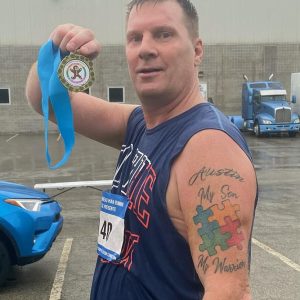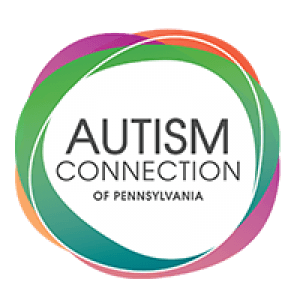Autism Connection of Pennsylvania is thrilled to announce sensory-friendly areas in development at the Family Division of the Allegheny County Courthouse. We explored the facility with The Honorable Jennifer McCrady, the judge who initiated the project, who also took time to answer our questions about the importance of sensory-sensitive spaces.

Judge Jennifer McCrady stands in the Sensory Room in the Allegheny County Family Division Courthouse
Autism Connection: What prompted you to create the sensory-friendly areas?
Judge McCrady: The Family Division is a chaotic environment and can be very overwhelming for members of the community to navigate. The majority of the individuals entering the building have experienced a trauma and may have any number of disabilities. We, as a court, needed to do better to recognize that the physical space was not conducive to the population that we serve. After input from stakeholders, youth, and families, the court partnered with Carnegie Mellon Human Centered Design class to revamp the space and communication. As part of the recommendations from CMU, it was clear that the court needed to make improvements for individuals with disabilities. The sensory room provides a quiet and calm space for an individual in a rather chaotic environment.
Using Physical Space to Create a Sense of Wellbeing
Autism Connection: Is physical space important to a person’s sense of wellbeing?
Judge McCrady: Yes, physical space is very important to a person’s wellbeing. The need for a calm, quiet, and safe space may be critical to helping the individual to successfully navigate the process. As a court and through the many improvements implemented, we are striving to be transparent, promote trustworthiness, and provide the public with a sense of empowerment as they navigate a stressful and hectic environment.
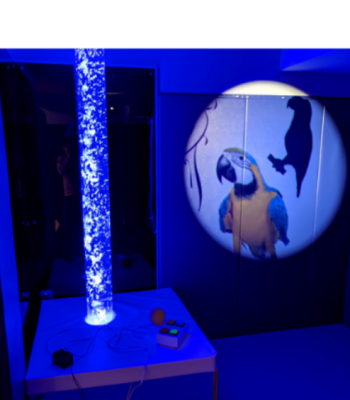
Photo of sensory room in the Family Division of the Allegheny County Courthouse
Autism Connection: What is the first step others can take in creating similar environments?
Judge McCrady: Start small by providing fidget toys to youth, improve signage in the facility, train system players and frontline court employees on how to interact with members of the public in a trauma-informed way. The first encounter with a court employee can set the tone for the rest of the experience. Build toward creating sensory spaces and sensory areas. Improve docket management systems so there is less downtime as well as reasonable expectations for waiting time. Provide quiet and cleaning waiting spaces with access to vending machines and wi-fi service.
![]()
Safe Family Resource Center and Wellness Clinic
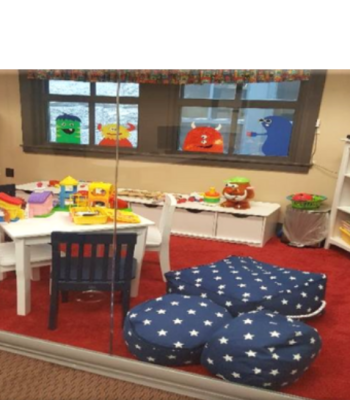
Safe Family Resource Center: Confidential areas for victims of abuse. Self-contained, private, play space for children and youth with separate waiting and check-in areas for plaintiffs and defendants
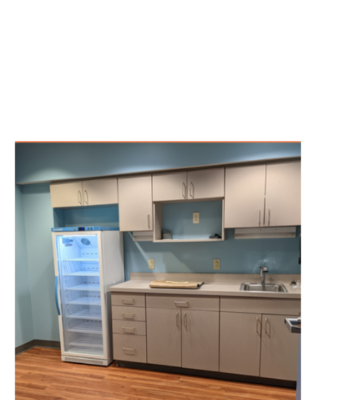
Wellness Clinic:
Easy access in the Children’s Room staffed by Children’s Hospital professionals, and available for all children waiting for a hearing
Creating the Conditions for Sensory-Friendly, Trauma-Informed Spaces
Judge McCrady anticipates factors that can add to stress when visiting the courthouse. The project addresses these issues by creating safe spaces, using technology, and clear signage throughout the building. Visitors know where they need to be, and when. Details like charging stations Wi-Fi access can alleviate common concerns. The sensory room serves as a retreat where visitors have control of their surroundings.
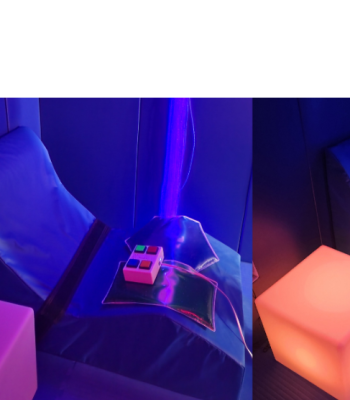
Comfortable seating with light and sound control
- Sensory-Friendly fidget toys available in every courtroom with many refills accessible by contacting Judge McCrady’s staff
- Outdoor retreat
- Outdoor playground
Autism Connection: Do you see this work becoming standard practice?
Judge McCrady: We found that there are many foundations and funders who are interested in this type of project and willing to help offset costs. If not for the many foundations that we worked with, we would not have been able to accomplish this project. Our hope is that court systems recognize the impact that trauma can have on an individual, and how important it is for our public court spaces to provide the appropriate and necessary trauma-informed accommodations for those with disabilities. It is an attainable goal.










